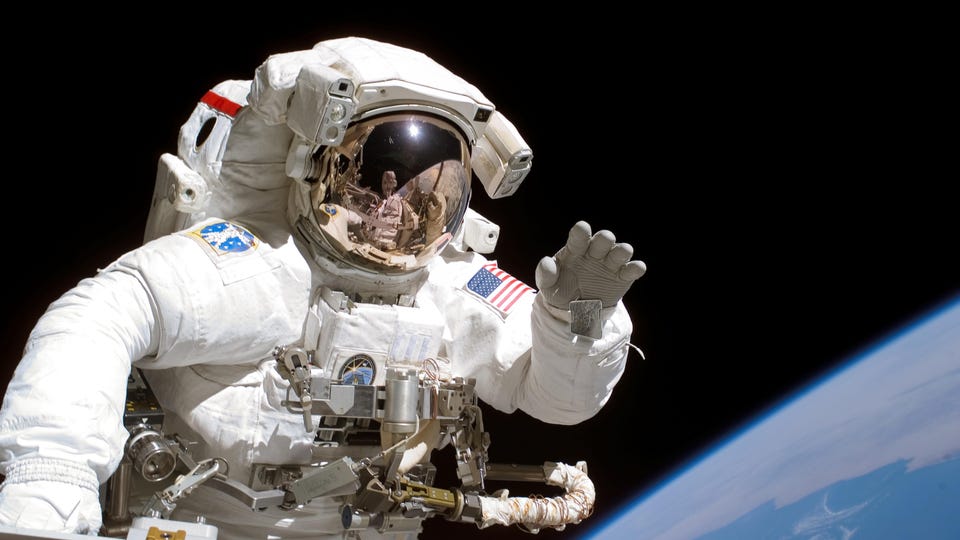Breaking Business Spaceflight Could Increase Risk Of Cancer And Heart Disease In Astronauts, Study Suggests Carlie Porterfield Forbes Staff I cover breaking news. New! Follow this author to stay notified about their latest stories. Got it! Aug 31, 2022, 06:26pm EDT | Share to Facebook Share to Twitter Share to Linkedin Topline Even short spaceflights may be associated with DNA mutations that can increase astronauts’ risk of heart disease and cancer later in life, according to a study published Wednesday in the journal Communications Biology , raising questions about spaceflight as several billionaire-backed companies race to turn visiting space into a tourist venture.
American astronaut Joseph Tanner waves to the camera during a space walk as part of the STS-115 . . .
[+] mission to the International Space Station, September 2006. Getty Images Key Facts A team of researchers from the Icahn School of Medicine at Mount Sinai studied blood samples taken from 14 NASA astronauts before and after they took part in relatively short spaceflight missions (with a median of 12 days) between 1998 and 2001. They discovered that all 14 astronauts’ blood had DNA mutations known as somatic mutations , specifically those characterized by the overrepresentation of blood cells derived from a single clone in a process called clonal hematopoiesis , which is most often caused by environmental factors like exposure to ultraviolet radiation.
While clonal hematopoiesis doesn’t necessarily indicate the presence of disease, it is associated with a higher risk of blood cancer and cardiovascular disease and can evolve into the more serious clonal hematopoiesis of indeterminate potential, or CHIP, according to the study. Researchers said the clonal hematopoiesis they observed was relatively small in size, but they were surprised by the findings, especially considering the astronauts’ relatively young age—their median age was 42 years old—and good health at the times of their spaceflights. The presence of the mutations does not mean the astronauts will develop cancer or heart disease, but the study’s lead author David Goukassian, a professor at Icahn Mount Sinai, said in a statement that the risk could increase from “ongoing and prolonged exposure to the extreme environment of deep space.
” The researchers recommended that NASA screen astronauts for somatic mutations and clonal expansion every three to fives years well into old age—when developing CHIP is more common—and called for larger studies to be done on the long term effects of spaceflight on the human body. Key Background Astronauts on spaceflights work in “ an extreme environment ” where many factors, particularly space radiation, can result in somatic mutations, Goukassian said. Previous studies have indicated radiation exposure and a lack of gravity puts stress on the bodies of astronauts and can affect the genes of people who traveled to space.
Even two years after astronaut Scott Kelly —who spent a year aboard the International Space Station—returned to Earth, about 7% of his genetic expression, or how his genes function within cells, had not returned to baseline levels when compared to his identical twin Mark, who was also an astronaut but did not accompany his brother on the year-long trip. The researchers at Mount Sinai decided to retrospectively study the health risks of spaceflights in part because of the “growing interest in both commercial space flights and deep space exploration,” Goukassian said in a statement . The private space travel industry has gone into overdrive in recent years, with billionaires Elon Musk, Jeff Bezos and Richard Branson each founding their own ventures in the “ billionaire space race ,” though currently the all-civilian flights on Musk’s SpaceX, Bezos’ Blue Origin and Branson’s Virgin Galactic typically only last a matter of minutes.
Further Reading NASA Scrubs Artemis I Rocket Launch. Here’s When It Will Blast-Off ( Forbes ) Most Expensive Jacket Ever Sold At Auction: Buzz Aldrin’s Apollo 11 Jacket Goes For Record $2. 8 Million ( Forbes ) Follow me on Twitter .
Send me a secure tip . Carlie Porterfield Editorial Standards Print Reprints & Permissions.
From: forbes
URL: https://www.forbes.com/sites/carlieporterfield/2022/08/31/spaceflight-could-increase-risk-of-cancer-and-heart-disease-in-astronauts-study-suggests/



